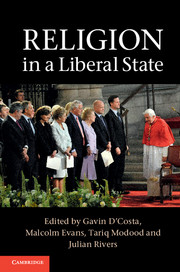Book contents
- Frontmatter
- Contents
- List of contributors
- Acknowledgements
- Introduction
- 1 Religion in a liberal state
- 2 The European Court of Human Rights and religious neutrality
- 3 Religion and sexual orientation: conflict or cohesion?
- 4 Liberal religion and illiberal secularism
- 5 Moderate secularism in liberal societies?
- 6 Excluded, included or foundational?
- 7 Justificatory secularism
- 8 What lacks is feeling: mediating reason and religion today
- 9 Arguing out of bounds: Christian eloquence and the end of Johannine liberalism
- Index
- References
7 - Justificatory secularism
Published online by Cambridge University Press: 05 June 2014
- Frontmatter
- Contents
- List of contributors
- Acknowledgements
- Introduction
- 1 Religion in a liberal state
- 2 The European Court of Human Rights and religious neutrality
- 3 Religion and sexual orientation: conflict or cohesion?
- 4 Liberal religion and illiberal secularism
- 5 Moderate secularism in liberal societies?
- 6 Excluded, included or foundational?
- 7 Justificatory secularism
- 8 What lacks is feeling: mediating reason and religion today
- 9 Arguing out of bounds: Christian eloquence and the end of Johannine liberalism
- Index
- References
Summary
Over the last two decades or so, secularism in Europe has often been mobilized as a legitimate public language for the expression of fears about Islam in contemporary societies (Laborde, 2008). But is there a core truth – or a grain of truth – in secularism, and if so, what is it? When we criticize the ideological uses of secular ideology, do we do so from an anti-secularist position, or from an alternative (untheorized) secularist standpoint? Here one could develop two distinct research projects. The first would be interpretative: it would lay bare the implicit normative basis of existing critiques of secularism. The second would be straightforwardly normative: it would seek to go back to first principles and identify the sense (if any) in which secularism can be articulated as a defensible position. In this chapter I pursue the latter strategy, and attempt to salvage a version of secularism that is both conceptually precise and politically plausible. Such desiderata commend themselves as inescapable for any academically sound theory of secularism. The term has become hopelessly inflated in public discourse and associated – by both its friends and foes – with a bewildering array of positions: separation between church and state, political rationalism, the privatization of religion, the embrace of statist modernity, Western imperialism, republican citizenship, women’s emancipation, Islamophobia, colonial and neo-colonial authoritarianism, and so forth. The ideological inflation is such that it is often difficult to ascertain what advocates and critics of secularism are exactly arguing about. This chapter is part of a wider project that seeks to identify a minimalist – indeed deflationary – definition of secularism and tease out its normative implications. Generally, I take secularism to be a political position about the proper relationship between the state and religion and, more specifically, one which singles out religion for both special protection and for special restrictions. Normative disputes about secularism can then be interpreted as disputes about what is ‘special’ about religion (in relation to other categories such as class, race, culture, ideologies, etc.) and whether such features justify specific constitutional, legal or political treatment.
- Type
- Chapter
- Information
- Religion in a Liberal State , pp. 164 - 186Publisher: Cambridge University PressPrint publication year: 2013
References
- 11
- Cited by



